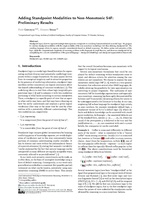Adding Standpoint Modalities to Non-Monotonic S4F: Preliminary Results
From International Center for Computational Logic
Adding Standpoint Modalities to Non-Monotonic S4F: Preliminary Results
Piotr GorczycaPiotr Gorczyca, Hannes StraßHannes Straß
Piotr Gorczyca, Hannes Straß
Adding Standpoint Modalities to Non-Monotonic S4F: Preliminary Results
In Nina Gierasimczuk, Jesse Heyninck, eds., Proceedings of the 22nd International Workshop on Non-Monotonic Reasoning, November 2024
Adding Standpoint Modalities to Non-Monotonic S4F: Preliminary Results
In Nina Gierasimczuk, Jesse Heyninck, eds., Proceedings of the 22nd International Workshop on Non-Monotonic Reasoning, November 2024
- KurzfassungAbstract
Standpoint logics allow to represent multiple heterogeneous viewpoints in a unifying framework based on modal logic. We propose to combine standpoint modalities with the single modality of the non-monotonic modal logic S4F, thus defining standpoint S4F. The resulting language allows to express semantic commitments based on default reasoning. We define syntax and semantics of the logic, study the computational complexity of reasoning problems in the fragment of simple theories, and showcase standpoint S4F by exemplifying two concrete instantiations of the general language — standpoint default logic and standpoint argumentation frameworks. - Projekt:Project: KIMEDS, MEDGE, SEMECO-Q2
- Forschungsgruppe:Research Group: Computational LogicComputational Logic
@inproceedings{GS2024,
author = {Piotr Gorczyca and Hannes Stra{\ss}},
title = {Adding Standpoint Modalities to Non-Monotonic {S4F:} Preliminary
Results},
editor = {Nina Gierasimczuk and Jesse Heyninck},
booktitle = {Proceedings of the 22nd International Workshop on Non-Monotonic
Reasoning},
year = {2024},
month = {November}
}

